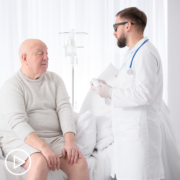Common Symptoms of Advanced Prostate Cancer
Common Symptoms of Advanced Prostate Cancer from Patient Empowerment Network on Vimeo.
What are common symptoms of advanced prostate cancer? Expert Dr. Xin Gao discusses the various symptoms that patients may experience and treatments that may be used to manage these common issues.
Dr. Xin Gao is a Medical Oncologist at Massachusetts General Hospital. Learn more about this expert Dr. Gao.
See More From INSIST! Prostate Cancer
Related Resources

How Does Prostate Cancer Progress? Understanding the Stages of Prostate Cancer |

|

What Key Factors Impact Prostate Cancer Treatment Decisions? |
Transcript:
Katherine:
What are common symptoms of advanced disease, and how are the symptoms managed?
Dr. Gao:
So, with advanced disease, the symptoms can present in a variety of different ways.
They’re often related to where the cancer has spread to. If there’s a tumor in the prostate gland itself or next to it, some patients might experience urinary symptoms, urinary frequency, feeling of incomplete emptying or a weak urinary flow. Or even pain or discomfort of leading with urination. That’s sort of the primary prostate tumor itself. Bone metastases can cause bone pain and commonly this involves bones in the spine or back or in the pelvis.
There’s also a heightened risk of fractures with bone metastases and obviously that can sometimes cause pain. However, I think I should mention, many bone metastases actually don’t cause pain. It’s not uncommon that we see a bone scan or a CAT scan that the cancer is in multiple bones, but the patient actually, you know, I think fortunately, doesn’t feel any pain from that.
Lymph node spread, I would say, rarely causes symptoms early on, but if there’s significant enlargement of these lymph nodes or in risking anatomic areas, sometimes the lymph nodes can cause discomfort or pain. Sometimes they can compress upon major veins or blood vessels or on the ureters that drain the kidneys and cause either blood clots or lower extremity swelling if it’s the major veins or cause kidney dysfunction because the ureters aren’t draining the kidneys appropriately. And then, I think in general, as with any advanced cancer, advanced prostate cancer can commonly cause fatigue and cause patients to just kind of generally feel unwell in sort of a hard to pinpoint type of way.
I think it’s sort of the general toll that the cancer – the burden of the cancer is causing on the body and maybe taking, you know, essential nutrients or other things away from normal body organs or body cells.
Katherine:
How are some of these symptoms managed?
Dr. Gao:
So, pain, if people have pain, it’s typically managed with analgesics and pain medications, whether it’s Tylenol or ibuprofen. Other NSAID types of medications. Opiates and narcotic pain medications are commonly used for advanced prostate cancers as well to control and manage and treat the pain. And patients with cancers involving the bones that have become resistant to standard hormone therapy, we also commonly give medications called bisphosphonates.
Zoledronic acid is a common one. Or a related medication called denosumab to try to reduce the risk of fractures, to strengthen the bones a bit. And these medications can also help with bone pain to some extent. And sometimes we treat other symptoms of cancer with medications that might help improve energy levels and improve the fatigue, for example.
So, methylphenidate or methylphenidate (Ritalin) is a common medication that is used to try to help with energy levels or reduced energy in advanced cancer patients. Sometimes steroid medications can do that as well, could be helpful. Appetite, reduced appetite with advanced cancer is not uncommon, although I think for prostate cancer, we see it to a lesser extent compared to other advanced cancers.
There are other medications, steroids being one of them, and medications like mirtazapine or Remeron can be used to help try to simulate the appetite a little bit more. In terms of other symptoms, urinary symptoms, let’s say from the primary prostate tumor, that’s often co-managed with my colleagues in urology. There are medications that can be used to try to help with the urinary flow or stream in some situations or perhaps procedural interventions that might be able to help open up the urinary outlet a little bit more. Those things can be considered as well.



